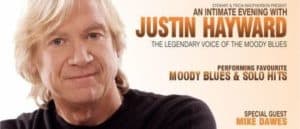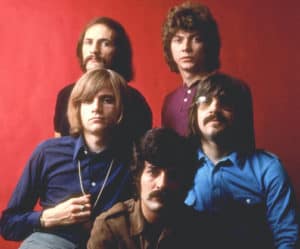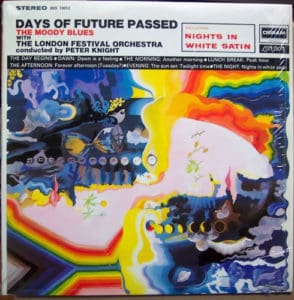Justin Hayward: The 13th Floor Interview
Justin Hayward has been fronting The Moody Blues since 1967 when they abandoned their early r&b sound and created something completely new with Days Of Future Passed.
Since then, the band has amassed an incredible legacy of work including iconic albums such as A Question Of Balance, Seventh Sojourn and In Search Of The Lost Chord, while also generating hit singles such as Question, Nights In White Satin and I’m Just A Singer In A Rock & Roll Band.
Now Justin Hayward brings his solo show to New Zealand with shows in Christchurch, Wellington and Auckland this October.
The 13th Floor’s Marty Duda spoke to Justin Hayward recently to find out more about this solo show, and what The Moody Blues are up to.
Click here to listen to the interview with Justin Hayward:
Or read a transcription of the interview here:
MD: You’re coming down to New Zealand in a bit, right?
JH: I’m very much looking forward to it in October, yes; around my birthday, as a matter of fact. I’ll be there for my birthday – the fourteenth of October. It’s been a long time since I’ve been there. I can’t actually… recall whether it was with The Moodys, that I was there last, or with The War of the Worlds.
MD: As far as I can tell, you were here with The Moodys in November of 2006….
JH: Okay. Well, I think I was there with Forever Autumn and War of the Worlds after that, but I don’t know.
MD: I think you might have been, yes.
JH: Anyway, looking forward to it very much, Marty.
MD: I think a lot of folks have seen you with The Moody Blues and even with War of the Worlds, but a solo Justin Hayward thing is a bit of an unknown for a lot of folks; so, maybe you can explain to us what that’s going to consist of and what you’re going to be doing.
JH: The show is a joy, for me. It’s about the songs and how they came about, what they’re about, what the times were like when I wrote those things, and some stories about the band in those times; and, of course some new things as well: things from my own album, Spirits of the Western Sky, and a new song called The Wind of Heaven, from the theme to a  movie. I’m with two young people that are just an inspiration to me. I’m with Mike Dawes, who is one of a generation of brilliant young guitar players, and absolutely brilliant! He opens the show for me, and then plays with me as well. I stand and watch him every night; and I’ve been playing guitar since I was eight years old, and I don’t know how he does it – he’s not hampered by the three chord trick that I grew up with – and Julie Ragins as well, who has the voice of an angel, and is a truly wonderful musician, and has been with me and The Moodys for a few years now. She’s a beautiful girl, and she’s a fantastic musician and keyboard player. It’s a joy for me…. It’s a situation that, as I wrote the songs as they sounded on my original demos that I took into the studio – and it’s a feel of music as well, because a lot of the early songs that Tony Clarke did with The Moodys: the acoustic guitar was mixed quite well up front – my show is closer to those early recordings, because there’s a lot of songs that we tried to do with The Moodys, but with two drummers, it’s just too loud to put the acoustic up front; so, this show is a joy for me, and I hope it will be for all the folks there too.
movie. I’m with two young people that are just an inspiration to me. I’m with Mike Dawes, who is one of a generation of brilliant young guitar players, and absolutely brilliant! He opens the show for me, and then plays with me as well. I stand and watch him every night; and I’ve been playing guitar since I was eight years old, and I don’t know how he does it – he’s not hampered by the three chord trick that I grew up with – and Julie Ragins as well, who has the voice of an angel, and is a truly wonderful musician, and has been with me and The Moodys for a few years now. She’s a beautiful girl, and she’s a fantastic musician and keyboard player. It’s a joy for me…. It’s a situation that, as I wrote the songs as they sounded on my original demos that I took into the studio – and it’s a feel of music as well, because a lot of the early songs that Tony Clarke did with The Moodys: the acoustic guitar was mixed quite well up front – my show is closer to those early recordings, because there’s a lot of songs that we tried to do with The Moodys, but with two drummers, it’s just too loud to put the acoustic up front; so, this show is a joy for me, and I hope it will be for all the folks there too.
MD: I’m sure it will be! It must have been difficult… with technology being the way it was back in the late ‘60s, early ‘70s, to get some of those songs across in a live scenario, with The Moody Blues: with a big band, and with the PAs being what they were, and all that. Was it frustrating to tour, around that time, and try and get the songs to sound the way they should?
JH: It was absolutely like that, yes, and I think we were a sort of split personality: we were The Moodys on record, and then we were The Moody on stage, that had to had to have huge

Marshall amplifiers… and it was a very different sound. Mike Pinder, who brought me to the band – the keyboard player – the ‘touring’ Moody Blues just didn’t suit him: the loud, big amplifiers; he was the first one to walk away from that…. He left in the seventies, but I could always see the two sides of it; so, I was comfortable with that. It wasn’t until the eighties that guitar technology even caught up, and you could use an acoustic guitar that you could put through the PA, and it would sound right. That’s the difference in this show: that I can hear every nuance of the vocals and the guitars; it’s lovely. I bring them from home – my home guitars – and it’s lovely.
MD: It’s got to be a very different experience – just in general – touring like that, than with a full band. It’s got to be a more sedate thing, which I’m sure is nice and mellow for you – I would imagine – right?
JH: It’s a joy; and to be with two young players is also a joy. I’ve got a good crew of people around me and my sound guy, my guitar tech, and I’m very privileged and very lucky, at this stage in my career, that I can work with people like this; it’s really lovely; but it’s still about the songs: we all love the songs and the stories behind them, and that’s what comes through.
MD: Your name is usually connected with John Lodge as well, because the two of you seem to have this partnership that’s been going on: you joined the band together… and when the band broke up, you guys still recorded together. I’m curious as to what the relationship is between the two of you. What is it that keeps the two of you working together?
JH: We didn’t know each other before – and in fact, as I mentioned, it was Mike Pinder who brought me to the band – but I think the personalities just changed; and as the influence of Mike… diminished, I think John was able to come forward; and I think, along with Graeme – who really is the lynch pin between the three of us – we’ve been comfortable in that touring mode. There’s no magic.. and there’s no special relationship, or anything like that; but I think the three of us – Graeme and John and myself – we have the music in common, and that’s what we love; so, we’re going to do that as long as we can. Let’s hope that continues! I don’t know what’s around the corner for The Moodys; that’s another story.
MD: Have The Moodys ever played their albums in their entirety, like a lot of folks tend to do these days? It seems… natural, because those albums were as one. Has that been bandied about at all?
 JH: Oh yeah, with Days of Future Passed particularly. I think we’re looking at that, yes; but – like I say – I don’t know what the future holds for The Moodys. It’s easier to predict for me, because I’m settled in this solo show, which I love, but The Moodys: I’ve never really known what’s going to happen. We’ve never really made long term plans. It always seems like everything worked out as we planned, but in real life, none of us quite know what’s going to happen next week.
JH: Oh yeah, with Days of Future Passed particularly. I think we’re looking at that, yes; but – like I say – I don’t know what the future holds for The Moodys. It’s easier to predict for me, because I’m settled in this solo show, which I love, but The Moodys: I’ve never really known what’s going to happen. We’ve never really made long term plans. It always seems like everything worked out as we planned, but in real life, none of us quite know what’s going to happen next week.
MD: When you joined the band, they were in a state of flux already, with Denny Laine having left, and the band was originally an R&B band, and you changed that. How did that change happen? Because it seems like a very stark difference between one and the other.
JH: It happened because I was lousy at singing rhythm & blues, but I was good at doing my own songs; and Mike Pinder wanted to do his songs as well, and his songs didn’t suit that rhythm & blues format; so, I think the tow of us – me and Mike – were conspiring, within The Moodys, to change things, and to just do our own material. It took us six months, or so, but we came round, and suddenly, with things like Tuesday Afternoon and Nights in White Satin, we found the sound that identified us; and then we had an identity, and then we could move forward, and everybody was comfortable with it. It settled down once we’d done those songs.
MD: That sound that you came up with was unique for the time – no one else was doing anything like that. Did you realise that you were in uncharted territory while you were doing that?
JH: We always went our own way, and we were very lucky that Decca – our record company – was run by some very stately, elderly men, who just said to us, “We’ll give you a lousy royalty, but you can have as much studio time as you want, because people – particularly hippies – seem to really love what you’re doing; so, just do it,” and we never had an A&R guy demanding that we made a hit record or single. We were very lucky with that, because we were with the greatest recording studio in London: Decca was the greatest classical recording studio that there was. That’s why Decca was eventually bought by Deutsche Grammophon, and then they consolidated the whole tremendous classical catalogue of great works that they had. The studio quality was fantastic, and what happened when it went into the digital domain, in the early ‘80s, was that our stuff was really suited to that format, because it was so beautifully recorded, unlike a lot of other stuff from the ‘60s, that was really made to just go on a 45, and come out of a Dansette record player; which I loved as well, but our stuff just happened to be… a beautiful stereo picture.
MD: Because you were recording in that studio, did that… influence the sound of the records? Was that part of the reason that you decided, “Oh, let’s have an orchestra on this record!”
JH: We didn’t make those decisions. It was somebody else’s decision, and we just happened to be in the right place at the right time, and we were the group that they were looking for to show a contrast with classical music, and to put the two things together. It wasn’t our idea. It was the stately men in Decca that had the idea, to demonstrate their own stereo system, and – like I say – we just happened to be in the right place. I wish there’d been a plan, but there wasn’t! We just fell into it, and we just got lucky.
MD: How do you look at your own solo career, compared to The Moody Blues? Because it’s been kind of ‘on and off’ when The Moodys aren’t doing ‘this’, and they’re in a state of flux, or whatever. When you’re writing a song, do you think in terms of, “Is this for the band, or is this for myself?” How do you approach it?
JH: I used to, but then I’ve made so many more solo albums in the last fifteen years than The Moodys have. I think we’ve come up with two, in the last twenty years, and I’ve come up with about seven; so, it’s not really a decision for me anymore. It used to be… I know exactly what you mean by the question. It was about some things that were so personal, I couldn’t use the ‘royal “we”’, I couldn’t ask anybody else to feel it as well; so, they went more to solo albums. It was Jeff Wayne, with The War of the Worlds, that gave me the biggest break, because with Forever Autumn, I had a hit all over the world; and that was a wonderful thing for me to have, and that meant that I was never short of a record company to offer me a contract, and to accept any kind of music that I made; which I’m very lucky, to this day, that that’s still the case.
MD: Why do you think it is that The Moodys haven’t made much new music in the last twenty years?
JH: I think, really, that there was no conscious decision. I think we just drifted away from the way…working together in the studio – technology changed the way you make records – and I felt that I was doing so much at home as well, and other musicians started to appear on Moodys records, sometimes, and different producers had different ideas; and I think, subconsciously, the three of us that were left – after Ray Thomas left back in 2003 – that we’d just explore, because The Moodys’ catalogue was so big in those first twenty years, that we just decided to really explore that, and enjoy it: enjoy the songs that we’d only ever spent two or three days making in the studio, and then never played them again. We’d decided just to enjoy that on stage; and I think that’s what we’ve been doing.
Justin Hayward in New Zealand:
Fri, Oct 13 Isaac Theatre Royal, Christchurch Ticketek
Sat, Oct 14 Michael Fowler Centre, Wellington Ticketek
Mon, Oct 16 ASB Theatre, Aotea Centre, Auckland Ticket Master
- Bill Withers Social Club Announce NZ Tour - April 16, 2024
- Greta Van Fleet Announce Australian & New Zealand Tour Dates as Part of their Starcatcher World Tour - April 16, 2024
- R.I.P. Michael Flynn: 13th Floor Photographer and Friend - April 15, 2024
